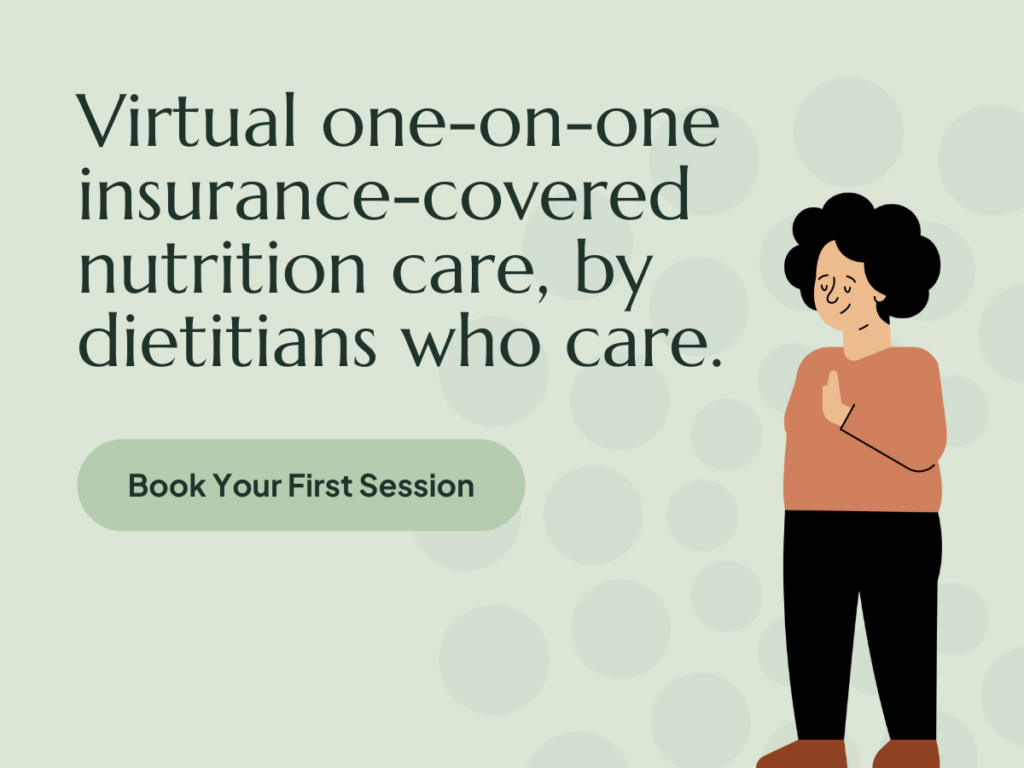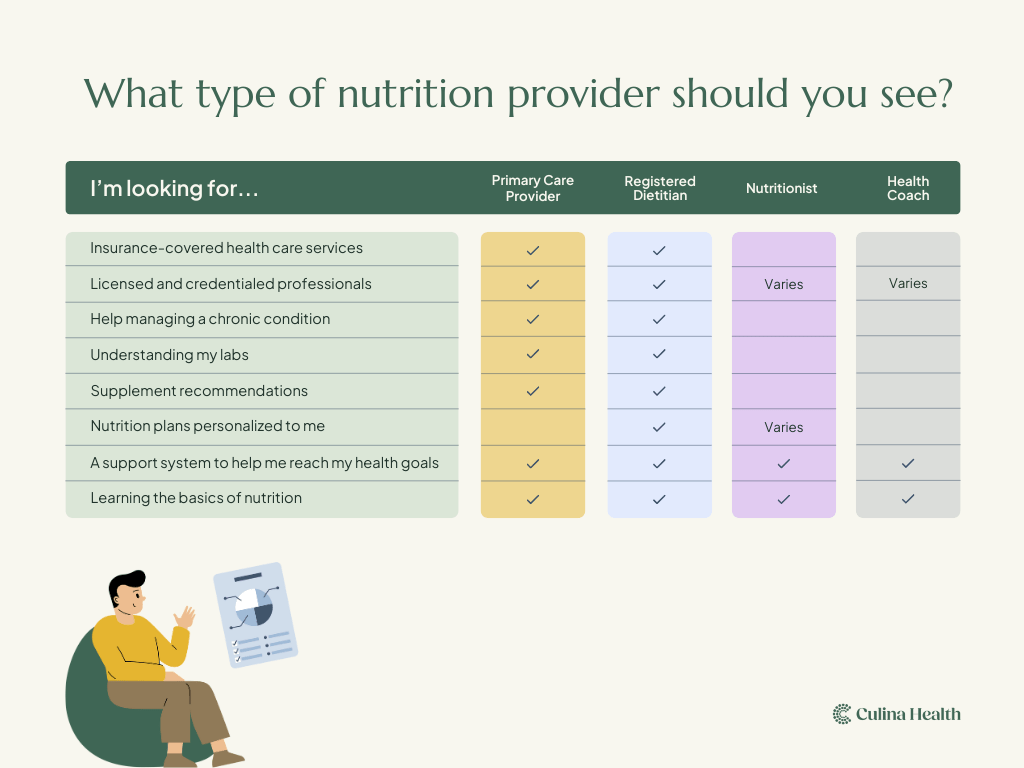Whether your search for nutrition care led you to Culina Health via a referral from your primary care provider (PCP), or by searching directly for registered dietitians, we’re thrilled to be here to support your nutrition goals. In your research, you may have also come across options to see a health coach or a nutritionist. These different types of healthcare providers are held to different professional and licensing standards, have different constraints in terms of their scope of practice, and have different areas of expertise and focus. What do you need to know to when choosing the right nutrition professional for your needs?
Whether you should work with a health coach, nutritionist, or registered dietitian depends on your current symptoms, health goals, and what type of support you’re looking for.
Read on for a breakdown of how to choose the right nutrition professional to suit your needs!
Registered Dietitians (RDs)
Training & Qualifications
Registered Dietitians (RDs), also known as Registered Dietitian Nutritionists (RDNs), are the type of nutrition professionals who make up our practice here at Culina Health. RDs are credentialed and licensed experts in the field of nutrition science. They all hold a degree in dietetics and have completed a supervised internship. At Culina Health, our RDs are also clinically trained, which means they have experience and training in hospital inpatient or outpatient settings. They are well-versed in working as part of a healthcare team with doctors, nurses, and other allied health professionals.
Registered dietitians are qualified to provide medical nutrition therapy (nutrition care aimed at assessing and treating chronic medical conditions) as well as tailored meal plans, and nutritional counseling for various health conditions and general health and wellness. For this reason, a registered dietitian is the only nutrition care professional who can bill insurance for your care. This is why your RD visit is most likely covered by your health insurance plan!
Approach
Registered dietitians approach nutrition care with an emphasis on evidence-based practices backed by science, clinical experience, and the latest research. They are required to stay up-to-date on the latest research in nutrition and related health fields to maintain their credential. They are also trained to provide personalized counseling to individuals and groups with different health needs and lifestyles.
A registered dietitian takes a highly-personalized approach to nutrition. They take into account your unique health needs, goals, cultural practices and lifestyle. They know that what works for one person may not work for all. A registered dietitian will begin your work together with an intake session, where they ask in-depth questions to get to know your health history, dietary preferences, and eating habits. For there, they collaborate with you to determine attainable goals and a tailored nutrition coaching plan. Together, you figure out the steps you need to take to reach your health goals. Culina Health registered dietitians are also trained in health behavior change. This enables them to support you in building healthy habits and not just in providing education and recommendations.
Where to Find Registered Dietitians
A registered dietitian works in clinical settings, hospitals, private practices (like Culina Health), or within public health settings such as community health organizations. They also work behind the scenes and consult for food and supplement companies on best practices.
When to See a Registered Dietitian
You should see a registered dietitian if you have a chronic condition that can be managed, improved, or sometimes even reversed by nutrition care. Examples of these conditions are prediabetes, PCOS, or high cholesterol (to name a few). Additionally, you should choose a registered dietitian if you want to be empowered with tools for nutrition, nutrition coaching and healthy eating, and have these sessions covered by your insurance plan. Also, if you want a professional partner in your nutrition journey who deeply understands your unique health history and needs, and can make sure that the care you’re receiving is specifically tailored to you.

Nutritionists
Training & Qualifications
Unlike a Registered Dietitian, the term “nutritionist” is not regulated, which means qualifications and expertise vary from nutritionist to nutritionist. Some nutritionists may have specialized certifications or degrees in nutrition-related fields but may not have completed a dietetic internship. Some have advanced degrees and many years of experience, while others do not.
While there are many highly qualified nutritionists out there, the lack of universal standard means that patients have to do their homework to vet potential nutritionists individually. If you meet with a nutritionist or come across one you’re interested in, make sure to ask them about their qualifications, licenses, and education to ensure it’s a good match.
Approach
This varies significantly depending on the nutritionist’s background and training. Most nutritionists cannot provide medical nutrition therapy. Seeing a nutritionist might be a better option if you are generally healthy (aka not dealing with any medical/chronic conditions) and are looking to learn about basic nutrition principles, as well as diet and lifestyle shifts you can make to optimize your well-being or achieve weight loss goals. Most nutritionists cannot credential with insurance companies, and therefore cannot bill insurance for care and have to charge out-of-pocket rates. This can be cost prohibitive for some people.
Where to Find Them
Nutritionists may work within their own private practice, health clubs, research settings, or consult for food or supplement companies.
When to See One
A nutritionist may be the right fit for you to see if you’re looking for general, high-level health and wellness guidance.
Health Coaches
Training & Qualifications
While there are no nationally-recognized requirements to become a health coach, there are reputable certifications a health coach may earn to demonstrate their training and experience, such as the The National Board for Health & Wellness Coaching. Health coaches cannot order or interpret lab work, prescribe any medications or supplements, provide a specialized eating plan, or give medical nutrition therapy advice. As with nutritionists, given the lack of standardized qualifications, it’s imperative that you do your homework and research to find the right provider to suit your needs.
Approach
Health coaches will often emphasize holistic wellness with a focus on sustainable lifestyle modifications, behavior changes, and long-term goal-setting. For example, you might work with a health coach to adopt a more balanced diet and incorporate more movement into your daily routine, but they cannot provide tailored meal plans or personalized medical nutrition therapy the way a registered dietitian can.
Where to Find Them
Like nutritionists, many health coaches may be self-employed or work in a private practice, or be employed in a corporate setting like a large company, school or fitness center.
When to See One
You should see a health coach if you don’t have any chronic or acute medical conditions. A health coach can be helpful if you are looking for ways to make long-term changes to your routine, stay motivated to eat in a balanced way, and get support with setting and sticking to goals.
Infographic: Choosing the Right Nutrition Professional For Your Needs

How Your Primary Care Provider Fits In
Your primary care provider, such as the doctor or nurse practitioner you see, plays a crucial role in your overall healthcare, including nutrition. While primary care providers are not nutrition specialists, they can offer basic nutrition guidance, screening for nutritional deficiencies, and referrals to specialized nutrition professionals (like RDs) when needed. And when you do work with an outside nutrition professional like a registered dietitian, it’s crucial that they communicate with your primary care provider to stay on the same page when it comes to your health habits, goals, and progress.
What to Consider When Choosing a Nutrition Health Professional
Vet Their Expertise and Professionalism
It’s critical that you assess what type of training, qualification and study your potential health professional has completed. Make sure any licenses they have are up to date, so you can enter into your work together with peace of mind and trust in the information they’re giving you. Also, make sure they don’t have a vested interest in selling you anything—while many may have recommendations if appropriate with your health journey, the right health provider won’t be trying to push you to purchase any certain brands, supplements or products to fatten their own wallets.
Dig Into Their Approach
Is this provider still using papers from 1985, or are they staying up-to-date with the latest nutrition science and research? Thanks to rapid advancements, things can change quickly in the nutrition field, and it’s critical that your provider has their finger on the pulse. Be wary of anyone promising quick fixes or rapid results, especially through restrictive or scientifically-dubious means—nutrition is about longevity, sustainability, and positive, incremental change.
Read The Reviews
Check websites where your potential provider may show up—whether it’s Google Reviews, Zocdoc, or something else. If a provider’s patients are taking time to give a glowing review, that’s always a good indicator they should be on your list. While one person’s positive review isn’t a slam-dunk indicator that this is the right provider for you, as with any provider-patient relationship there’s always a personal fit element, it’s definitely a green flag—and bad reviews are definitely a reminder to exercise caution and do more research before scheduling with that particular person. If a provider or practice has a conspicuous absence of reviews, or if their reviews don’t seem to be verifiable, that’s also a cause for pause, as reviews may have been removed/scrubbed/ or altered.
Ensure Your Care Works For You
A nutrition professional worth your time should be offering personalized advice that’s tailored to you. They should consider everything from your lifestyle, cultural background, and health goals. An initial consultation should always cover your medical history, food intolerances, dietary preferences, and medications you take, as well as a food diary or recall exercise to get an understanding of your current eating patterns. Beware of a professional who doesn’t seem to think these factors are important, or who wants you to jump on trendy diets or offers generic advice without taking time to consider whether it’ll work for you. Nutrition is not one-size-fits-all!
Consider Affordability
While some health coaches and nutritionists may be part of community or corporate settings that offer enhanced access to their care, their services aren’t covered by insurance the way RDs and primary care providers are. It’s important to assess what type of care you need, and how it can fit into your budget or lifestyle. Nutrition care should be additive, not an additional stressor!
Patient Support
The care a potential new provider gives you during an appointment is just the tip of the iceberg when it comes to patient support. Look into what type of support a practice is offering you during onboarding, before your appointment, after your appointment, and on an ongoing basis. Some practices will help you with questions about insurance, billing, logistics, and make it easy to manage appointments or troubleshoot any technical issues. While these services are not directly provided by an RD, they can often impact how you interact and communicate with your provider, and will enhance your patient experience and set some practices apart from others.
The Bottom Line on Choosing A Nutrition Professional
To sum it up, determining the right nutrition professional for your needs depends on various factors, including your budget, insurance coverage, health goals, medical conditions, and preferred approach to nutrition care. A registered dietitian, like the ones we have at Culina Health, offers specialized and personalized medical nutrition therapy, while nutritionists provide general nutrition advice, health coaches focus on holistic wellness, and primary care providers offer basic nutrition guidance within a broader healthcare context. By understanding the roles and expertise of each professional, you can make an informed decision to support your nutritional health effectively, and achieve lasting, positive progress on your health goals.





